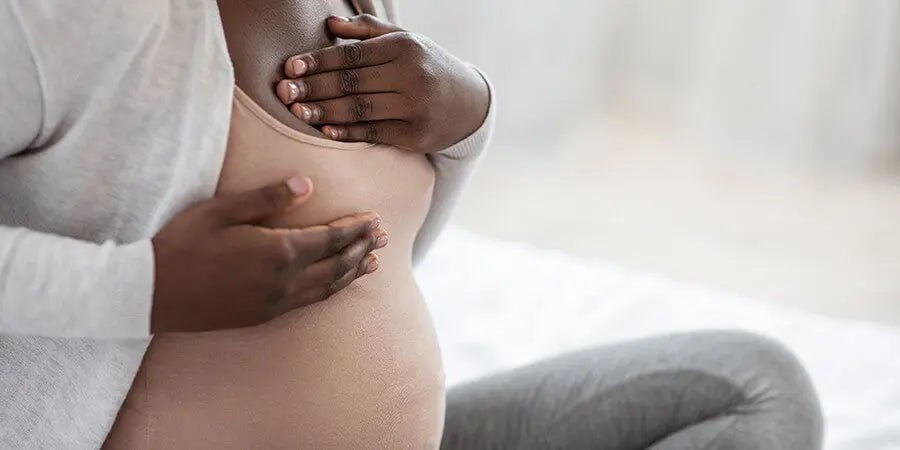Itchy nipples during pregnancy are very common. Here is what usually causes it, how to soothe the itch safely, and the signs that mean you should speak to a healthcare professional.
Are itchy nipples normal in pregnancy?
Yes, itchy nipples and breasts are a very common pregnancy symptom. Hormonal shifts increase skin sensitivity, and breast growth stretches the skin which can feel dry and itchy. While most itch is harmless, a small number of cases are linked to conditions that need medical advice, so it helps to know the red flags (see when to worry).
Common causes of itchy nipples in pregnancy
1) Hormonal changes (very common)
Rising oestrogen and progesterone can make the skin on your breasts and nipples more sensitive and reactive. This is the most typical reason for itch in pregnancy.
2) Skin stretching and dryness
As breasts grow in preparation for feeding, the skin stretches and can lose moisture. Keeping the area comfortably moisturised and avoiding harsh cleansers helps.
3) Eczema or dermatitis
If you have a history of eczema, pregnancy can trigger flare-ups on the breasts and areola. Look for dry, scaly, itchy patches. Choose fragrance-free, gentle products and soft fabrics next to skin.
4) Yeast infection (breast thrush)
Warmth and moisture can encourage yeast overgrowth, causing intense itch, burning, shiny or red skin, or a rash. It is treatable, and pharmacist or GP advice is recommended for safe options in pregnancy.
5) Contact irritation
New detergents, fragranced body products, tight or abrasive bras, or sweat build-up can irritate the nipple and areola. Switch to breathable cotton, wash new fabrics before wear, and keep the area dry.
6) Less common but important to rule out
- Mastitis, more common when breastfeeding: pain, redness, warmth, fever.
- Pregnancy-related liver issues, such as intrahepatic cholestasis: generalised itching that can be worse at night, often without a rash. Seek medical advice, especially in the third trimester.
- Skin infections or other dermatological conditions that benefit from clinician assessment.
Itchy nipples in early pregnancy
Increased blood flow and rapid hormonal change can make nipples feel tingly, sensitive, or itchy in the first trimester. While itch alone does not confirm pregnancy, it often appears alongside other early signs such as breast fullness, darkening areolae, fatigue, and nausea.
Itchy nipples: period or pregnancy?
Premenstrual hormone shifts can also cause breast or nipple sensitivity. If your period is late and you notice additional early-pregnancy symptoms, consider a home test and speak with your GP or midwife for personalised advice.
Safe ways to relieve itchy nipples in pregnancy
- Moisturise regularly with gentle, pregnancy-safe balms or oils. Apply after bathing while skin is slightly damp.
- Choose breathable fabrics such as cotton bras. Avoid lace or seams that rub. Change damp or sweaty clothing promptly.
- Avoid harsh products including strong fragrances, alcohol-heavy toners, and rough scrubs on the breast area.
- Keep showers lukewarm and brief. Pat skin dry rather than rubbing.
- Apply a cool compress for 5 to 10 minutes to calm acute itch.
- Ask a pharmacist which creams are suitable in pregnancy, especially for eczema or suspected thrush.
Note: If a product stings, burns, or worsens irritation, stop using it and seek advice.
When to contact a midwife or GP
- Severe itch that keeps you awake or affects much of the body, especially later in pregnancy.
- Itch with yellowing of skin or eyes, dark urine, pale stools, or right-upper-abdominal pain.
- Red, hot, swollen, or painful breast with fever or feeling unwell (possible infection).
- Cracked, bleeding, oozing, or rapidly spreading rash.
- No improvement after a few days of self-care, or if you are unsure what is safe to use.
Frequently asked questions
What can I do to soothe itchy nipples quickly?
Apply a gentle, pregnancy-safe moisturiser or balm twice daily, wear a soft cotton bra, and use a brief cool compress. If there is no improvement after a few days, or if signs of infection appear, seek advice.
Are itchy nipples an early sign of pregnancy?
They can be, due to hormone changes, but itch alone is not diagnostic. Consider a pregnancy test if your period is late or you have other symptoms.
Do I need new bras or clothing?
Supportive, breathable, non-wired bras and soft fabrics help reduce friction and sweat build-up. Many people find moving up a cup or back size during pregnancy more comfortable.
Why are my nipples peeling?
Usually dryness from stretching skin. Moisturise regularly and avoid hot showers and fragranced products. If there is cracking, bleeding, or pain, seek advice.
Could it be an infection or something serious?
Possible signs include intense itch with a shiny or red rash (thrush), a red, hot, painful breast with fever (infection), or generalised night-time itch later in pregnancy (possible liver-related itch). Contact your midwife or GP if concerned.
For further advice on pregnancy wellbeing, visit our How to have a healthy pregnancy blog.





